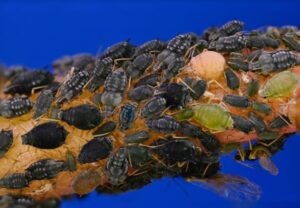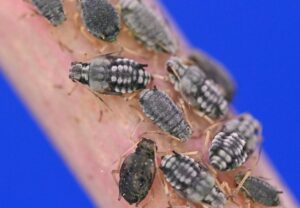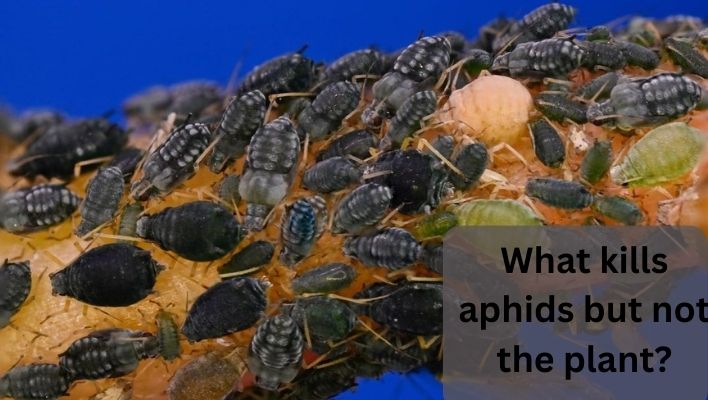Aphids are a common pest that can cause significant damage to plants, especially in large infestations. Their presence can stunt plant growth, deform leaves and flowers, and even kill the plant in severe cases. This is because aphids transmit viruses and bacteria to plants, which can weaken their immune system and make them more susceptible to other pests and diseases.
Many gardeners and farmers resort to chemical insecticides to eliminate aphids, but these products can also harm the plant and the environment. Therefore, finding alternative solutions that kill aphids without damaging the plant is essential.
Despite their harmful effects, finding a solution that doesn’t harm the plant itself is important. This is because plants play a crucial role in our ecosystem, providing us with oxygen, food, and habitat for other organisms. In this article, we will explore some methods that can be used to control aphids without harming the plant.
Understanding Aphids
Aphids are small, soft-bodied insects that feed on the sap of plants, causing damage to leaves, stems, and flowers. They reproduce rapidly and can quickly infest a plant, making them a common pest in gardens, farms, and greenhouses.
There are over 4,000 species of aphids, and they come in different colors, shapes, and sizes. Some aphids have wings and can fly, while others are wingless and crawl on plants. They also vary in their preferred host plants, with some species infesting only one type of plant and others attacking a wide range of hosts.

The life cycle of aphids is simple but efficient. Female aphids give birth to live young, which are clones of themselves. These nymphs feed on the plant sap and molt several times before maturing into adult aphids.
The adults can reproduce without mating, and a single female can produce up to 80 offspring weekly. In favorable conditions, aphids can complete their life cycle in as little as a week, allowing them to build up large populations on a plant quickly.
Understanding aphids’ life cycles and characteristics is essential to control their populations effectively. By identifying the species of aphids on your plants and knowing their life cycle, you can choose the most appropriate control method and reduce their impact on your plants.
What kills aphids but not the plant
Many natural and chemical methods can kill aphids without harming the plant. Some of these methods include:
- Natural Ways to Kill Aphids
- Physical methods
- Chemical options
Natural Ways to Kill Aphids
Chemical insecticides can harm plants and the environment, but several natural methods exist to control aphids effectively. Here are some of the most effective natural ways to kill aphids:
Use of Soapy Water or Insecticidal Soap:
Soapy water is a simple and effective way to kill aphids on plants. Mix a few drops of dish soap in a spray bottle filled with water and spray the solution directly on the aphids. The soap will dissolve the protective wax coating on the aphids’ bodies, causing them to dehydrate and die.
Insecticidal soap is a more potent version of soapy water specifically designed to kill insects while being safe for plants. It works by breaking down the outer layer of the aphids’ bodies, causing them to dry out and die. Be sure to test the soap on a small part of the plant before spraying it to ensure it does not cause damage.
Neem Oil and its Effectiveness:
Neem oil is a natural pesticide derived from the seeds of the neem tree. It disrupts insects’ hormonal balance, preventing them from feeding and reproducing. Mix neem oil with water and spray the solution on the affected plants to kill aphids. Neem oil is also effective in repelling other insect pests and can help to prevent future infestations.
Essential Oils that Repel Aphids:
Several essential oils, such as peppermint, clove, and eucalyptus, are known to repel aphids. Mix a few drops of these oils with water and spray the solution on the plants to create a barrier that aphids will avoid. This method is not as effective as killing the aphids directly but can help to prevent future infestations.
Ladybugs as Natural Predators of Aphids:
Ladybugs are natural predators of aphids and can be an effective way to control their populations. Release ladybugs onto the affected plants, and they will feed on the aphids, reducing their numbers. Ladybugs are available for purchase from gardening stores or can be attracted to your garden by planting flowers that they are attracted to, such as dill or fennel.
By using these natural methods, you can effectively control aphids on your plants without harming the environment or your plants.
Physical methods
Physical methods for controlling aphids involve using non-toxic, mechanical techniques to remove or deter them from the plant. These methods can be highly effective, especially when combined with other natural control methods. Here are some physical methods for controlling aphids:
Pruning and Removing Affected Parts of the Plant:
Pruning and removing affected parts of the plant is an effective way to control aphids. This method involves inspecting the plant for signs of infestation and then removing the affected parts using pruning shears. This will help to remove the aphids and prevent them from spreading to other parts of the plant.
Using Water to Blast off Aphids:
Using water to blast off aphids is another effective physical method for controlling aphids. This method involves spraying the plant with a strong jet of water to dislodge the aphids from the leaves and stems. This will help to remove the aphids and prevent them from feeding on the plant. Use a strong enough water jet to remove the aphids without damaging the plant.
Using Sticky Traps to Catch Aphids:
Using sticky traps is an effective way to catch and control aphids. This method involves placing sticky traps near the affected plant to catch the aphids. The sticky traps attract and trap the aphids, preventing them from feeding on the plant. This method is especially effective when combined with other natural control methods.
Physical methods are generally safer and more environmentally friendly than chemical methods and should be used as the first line of defense against aphids. However, they may not be as effective as chemical methods and may need to be combined with other control methods to achieve the desired results.
Chemical options
While natural methods are generally preferred for controlling aphids, chemical options are also available. However, it is essential to be aware of the potential harm chemical insecticides can cause to plants and the environment. Here are some chemical options for controlling aphids
Insecticides are chemical pesticides that are designed to kill insects. They can effectively control aphids, but they can also harm beneficial insects and the environment. Insecticides can also leave residues on plants, harming humans and animals that consume them. When using insecticides, following the instructions carefully and applying them only when necessary is crucial.
Selective Insecticides that Target Aphids Specifically:
Selective insecticides target specific pests while being less harmful to beneficial insects and the environment. Several selective insecticides are available that target aphids specifically, such as imidacloprid and acetamiprid.
These insecticides disrupt the aphids’ nervous system, causing them to die. However, they can also harm bees and other pollinators if used incorrectly.
Bonide (BND95349) – Insect Control Systemic Granules
Bonide (BND95349) – Insect Control Systemic Granules is a chemical option for controlling aphids. These granules contain imidacloprid, a systemic insecticide absorbed by the plant’s roots and transported throughout the plant’s system. When aphids feed on the plant, they ingest the insecticide and die.
While this product can effectively kill aphids, it is important to use it carefully and follow the instructions on the label. Systemic insecticides like imidacloprid can harm bees and other beneficial insects, so avoiding using them on plants that attract pollinators is best. Additionally, it is important to avoid using systemic insecticides on edible plants, as they can harm humans if consumed.
Overall, while Bonide (BND95349) – Insect Control Systemic Granules can effectively kill aphids, it is important to consider the potential risks and limitations of using chemical options and use them responsibly.
Dr Earth 8004 Ready to Spray Yard and Garden Insect Killer
Dr. Earth 8004 Ready to Spray Yard and Garden Insect Killer is another chemical option for controlling aphids. This product is made with natural ingredients, including essential oils and plant extracts, effectively killing aphids and other garden pests.
Attach the sprayer to your garden hose and thoroughly spray the affected plants to use this product. The product is safe for all types of plants, including fruits and vegetables, and it is safe for pets and people to enter the treated area after the spray has dried.
While Dr. Earth Ready to Spray Yard and Garden Insect Killer is a natural alternative to traditional chemical insecticides, it is important to note that it is still a chemical option and may have some associated risks.
It is always important to read and follow the instructions on the label carefully and to use any chemical insecticide responsibly. As with any insecticide, avoiding using it on plants that attract pollinators is best to avoid harming bees and other beneficial insects.
Precautions When Using Chemical Options:
When using chemical options to control aphids, taking precautions to minimize their impact on plants and the environment is essential. Follow the instructions on the label carefully and use the appropriate protective equipment, such as gloves and a mask. Avoid spraying during windy conditions or when bees are active, as this can increase the risk of harming beneficial insects. It is also essential to avoid applying insecticides near water sources, as they can contaminate the water and harm aquatic life.
While chemical options can effectively control aphids, they should be used as a last resort and with caution. Natural methods are generally safer and more environmentally friendly and should be the first line of defense against aphids.
How to Prevent Aphid Infestation
Preventing aphid infestations is an important step in controlling aphids. By preventing infestations, you can reduce the need for control measures and keep your plants healthy. Here are some ways to prevent aphid infestations:
- Keep Your Plants Healthy: Healthy plants are less likely to attract aphids. Ensure your plants are well-watered, well-fed, and free of diseases or pests. Regularly inspect your plants for signs of infestation, and remove any affected parts immediately.
- Use Companion Planting: Companion planting is a technique that involves planting certain plants together to help deter pests. Some plants are natural repellents to aphids, such as garlic, chives, and mint. Planting these plants near your vulnerable plants can help to prevent aphid infestations.
- Use Mulch: Mulch can help to prevent aphids from infesting your plants. Aphids are less likely to infest plants that are covered with mulch because it makes it harder for them to find a suitable place to feed.
- Introduce Beneficial Insects: Introducing beneficial insects, such as ladybugs and lacewings, to your garden can help to control aphids naturally. These insects feed on aphids and can help control their populations.
- Practice Good Hygiene: Practice good hygiene in your garden by regularly removing dead plant material, weeds, and debris. These materials can harbor aphids and other pests, increasing the risk of infestations.
Following these prevention methods can greatly reduce the risk of aphid infestations in your garden. Preventing aphids from infesting your plants in the first place is much easier and safer than trying to control them after they have become a problem.

Conclusion
Aphids can be a major nuisance for gardeners, but many ways exist to control them without harming your plants. In this article, we have explored various natural, chemical, and physical methods for controlling aphids. Some of the natural methods we discussed included using soapy water, neem oil, essential oils, and ladybugs.
We also explored chemical options such as insecticides and selective insecticides that target aphids specifically. Finally, we discussed physical methods such as pruning and removing affected parts of the plant, using water to blast off aphids, and using sticky traps to catch aphids.
While chemical methods can be effective, they should be used cautiously and as a last resort. Natural methods are generally safer and more environmentally friendly and should be the first defense against aphids. Preventative measures such as regular maintenance of plants, companion planting, and a welcoming environment for natural predators can also help prevent aphid infestations.
In conclusion, protecting plants while solving pest problems is essential for maintaining a healthy garden. We encourage you to try the natural options first and use chemical options cautiously and only when necessary. With these methods in mind, you can effectively control aphids and keep your plants healthy and thriving.



